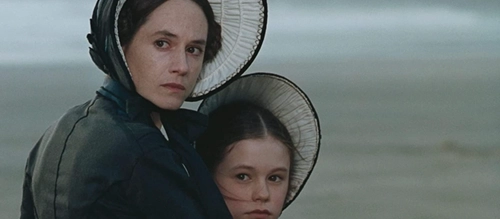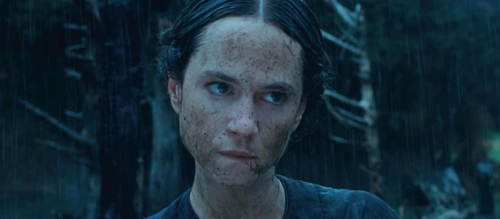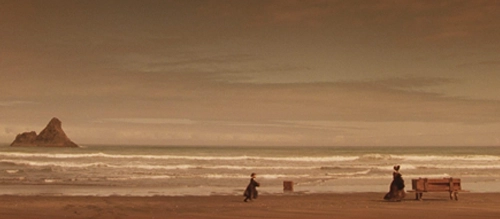
The Piano (1993)
Director: Jane Campion
Screenwriter: Jane Campion
Starring: Holly Hunter, Harvey Keitel, Sam Neill, Anna Paquin
Jane Campion’s The Piano begins with a monologue from Ada McGrath, a young Scottish woman who, for reasons that are never fully explained, stops speaking at the age of 6. She cautions us that the voice we hear, the high pitched, lyrical voice of Holly Hunter doing an impeccable Scottish accent, is not her speaking voice, but her mind’s voice. Ada’s father recently married her off to a man she does not know, and she and her young daughter, Flora (Anna Paquin), are being shipped off to live with him on the coast of colonial New Zealand. Her new husband, Alistair Stewart (Sam Neill) says he does not mind her muteness, which Ada says is a good thing. “Silence affects us all in the end,” she cautions.
The Piano, released in the summer of 1993, earned writer and director Jane Campion the prestigious honor being the first female director to win the Palme d’Ore at the Cannes Film festival. 30 years later, The Piano remains one of Campion’s most recognizable and beloved films, revered for its performances – Holly Hunter and Anna Paquin both received Academy Awards for their work – score, and haunting cinematography. It’s a gothic tale of love and lust and the violent ways men seek to control not just women, but the world.
Ada may not physically use her voice to speak, but she is not silent. She communicates in many ways throughout the film using sign language, pen and paper, her piano. For Campion, the piano symbolizes Ada’s voice, and the way the men in the film treat her piano speaks volumes about who they are. Stewart is clearly ignorant and unwilling to truly listen to Ada, to learn to communicate in her way. He disregards her piano, leaving it on the beach, selling it off, and eventually taking an axe to it. In contrast, George Baines (Harvey Keitel), rescues her piano – he gets it tuned for her. He sits next to her as she plays. He learns her language.

The Piano features stellar performances across the board, but Holly Hunter is a particular knock out. She’s practically unrecognizable as Ada, truly embodying this maddening, strong-willed, opinionated woman, changing the cadence of her voice, her face pale and eyes dark. Hunter proves what audiences have known since the silent era – acting is more than just talking, more than just words. You have to put your entire body into it. Hunter’s physicality is loud and demanding – she breaks glasses, she twists her face in anger and disapproval, she signs with passion. The fact that Hunter does all of the piano playing in the movie by herself only adds to how authentic her portrayal feels.
Sam Neill and Harvey Keitel are equally as good as Ada’s possessive husband and her eventual lover, respectively. Neill gives a particularly nuanced performance as a man who takes out is own inadequacy on everyone around him. It is a quiet, burning performance that builds to a fantastic, terrifying explosion of repressed anger and jealousy.
The Piano is fashioned after the classic gothic romance that flourished in the late 18th and early 19th centuries, clearly inspired by many of the female voices that dominated the genre. Campion’s films in general borrow heavily from gothic horror and romance. Her films are often beautiful and horrifying at the same time, sex and violence and mystery all tangled up together. As has been pointed out by numerous critics in the past, the film feels deeply literary, an adaptation of a much older tale. In particular, Campion said that Wuthering Heights was one of the sources she drew upon for inspiration. It’s also worth noting that the play the children perform in the movie is “Blue Beard“, the French folktale in which a man murders his wives and hides their bodies away in a secret room in his manor.
While the film isn’t quite that bloody, it is violent and cruel. Stewart is uninterested in nurturing who Ada is. He doesn’t understand her, so he has to break her, to make her submit. Ada may not speak in words, but she is still the kind of woman who must be reigned in and caged. After a particular act of gruesome violence towards the end of the movie leaves Ada bleeding and covered in mud, Stewart says simply, “I only clipped your wing.” Vitally, Campion contrasts this brutality with scenes of gentle intimacy. Touch is a huge part of The Piano, and Campion highlights how in Victorian society merely touching someone through a small hole in their stocking is infinitely erotic. Campion uses the nakedness of her characters to show how vulnerable it feels to show someone that part of yourself. While the nudity in The Piano is by no means excessive, it does remind us of something we’ve lost in modern cinema: the ability to portray genuine intimacy and eroticism. The ability to feel.
While The Piano focuses mainly on Ada and her journey, the film also explores the detrimental effects of colonialism on the environment and its indigenous people, although Campion’s depiction of the Maori has been criticized for playing into racist stereotypes. And it’s true that Campion does not spend much time developing these characters. They are portrayed as simple-minded, sexually suggestive, and unrefined. Reshela DuPuis delves this and more in her essay, “Romanticizing Colonialism: Power and Pleasure in Jane Campion’s The Piano.“

Still, it’s worth noting that Stewart’s treatment of the Maori people is clearly wrong. He tries to take their land, bribing them with everything from guns to buttons. He can’t imagine why they wouldn’t want to give up their sacred burial grounds. Just as with his treatment of Ada, Stewart is uninterested in understanding anyone who doesn’t speak his own language, believing them to be unintelligent and inhuman.
In 2013, Campion said that she originally intended for The Piano to have a much bleaker ending. “It would be more real, wouldn’t it?” Campion said during an interview with The Guardian. Perhaps it would be more real. As it stands, the ending is one of the most iconic sequences of the film.
The ending, like the rest of the film, sticks with you. It gets under your skin and crawls around. With The Piano, Jane Campion gives us one of the strongest female characters of the late 20th century, entangled in a story that is as vast, as dark and as deep as the ocean itself.
Score: 23/24

